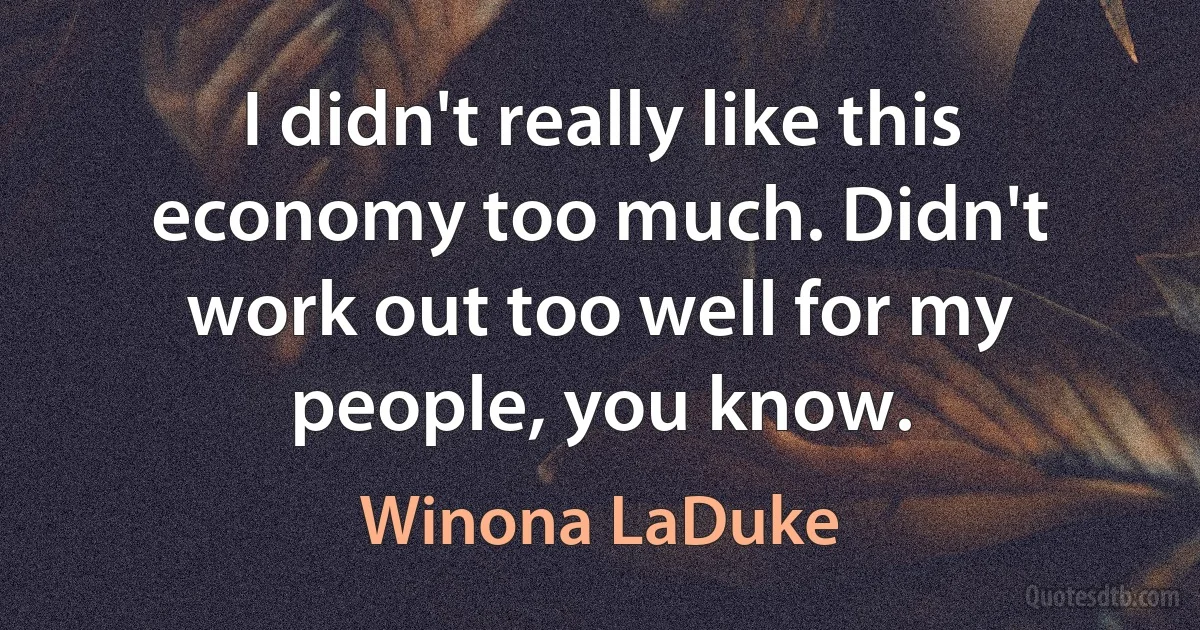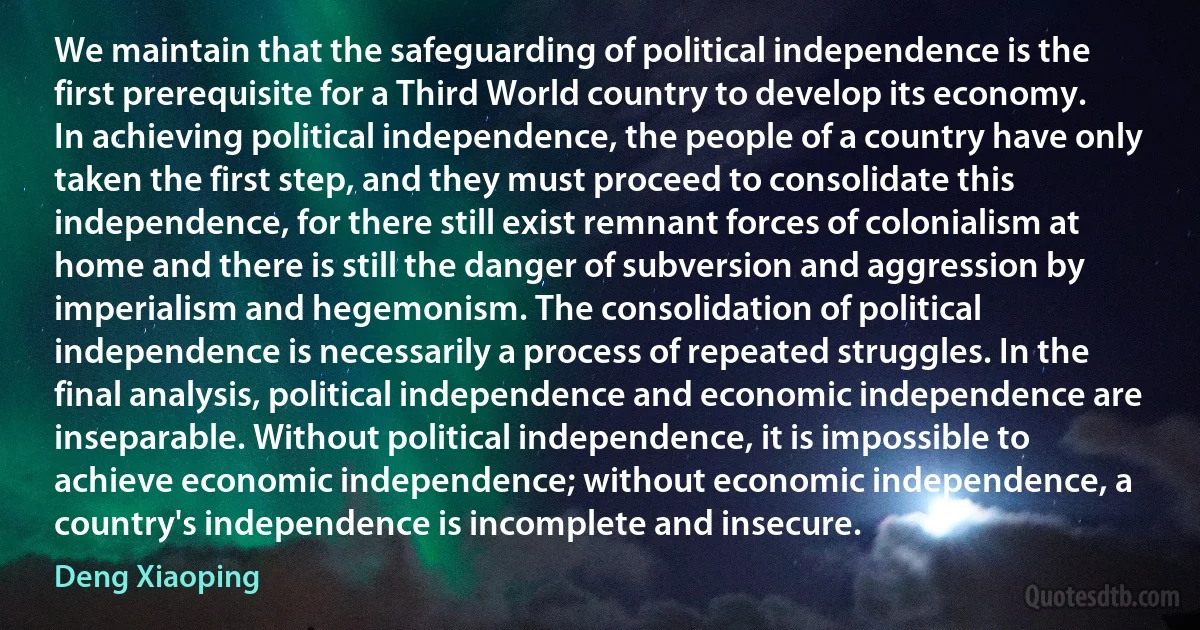Economy Quotes - page 92
What I want to do is to rebuild the hemp industry in Indian country. And I want us at the table, not on the menu. I want us to be in the leadership of this next economy, because we have a lot of territory upon which you can grow hemp. And we can rebuild the light manufacturing industry in this country.

Winona LaDuke
One time I was sitting in Sitka, Alaska-did you ever get a chance to go there? Beautiful. Like sometimes you just go someplace. I was at a writers' workshop. I was in Sitka, Alaska, and I was watching-you know, the eagles were capturing the salmon that had come in. And so there was like eagles diving down into the ocean, and, you know, the salmon. And there were bears. And I looked out there, and I saw this cruise ship coming into the left of my vision. And it came in, and I was like, "Oh, I don't like that.” The cruise ship came in, and then I watched that cruise ship turn a 180 and go exactly back out. And that's basically what we've got to do. You know, we have to make the next economy, and that next economy is going to be green. That next economy is going to have people like me making decisions. I'd like to be an architect for the next economy. I didn't like the last one.

Winona LaDuke
You wanna feel bad for someone in a down-turned economy, I'll give you someone...prostitutes. Because a prostitute doesn't have that same "worst case scenario" b-plan that we all enjoy. No matter how shitty things are going for you on the job, "Danny, if they lay off anymore people, I'm gonna be out on the streets sucking dick for a living. I got nothin' else. I'm serious." Hooker doesn't have that same safety net. Hooker's already out there, sucking dicks.

Doug Stanhope
[If Britain withdrew from the EEC] the wild men of the left would certainly try to build a barrier against the outside world. But they would be confronted by such powerful economic gales that they would be forced to build the barriers higher and higher until they had finally built an economic Berlin wall around Britain. Within that wall would be a socialist state running a siege economy.

Edward Heath
Steve Kroft: In the last two years, you have been blamed for the financial collapse of Thailand, Malaysia, Indonesia, Japan and Russia.
George Soros: All of the above.
Steve Kroft: All of the above. Are you that powerful?
George Soros: No. I think there's a great misunderstanding.
Steve Kroft: The prime minister of Malaysia said that the region spent 40 years trying to build up its economy, and along comes a moron like Soros with a lot of money, and it's all over. He called you a criminal.
George Soros: It's easier for him to blame an outside force than to admit that they were mismanaging their economy and their currency. The French finance minister talked about hanging speculators from lamp posts.

George Soros
Well I mentioned Hayek. There are two ways. One is because of my interest in political economy. The other way is that Hayek was a pioneer in the use of information in economics. One of the papers that Karl and I wrote together that I continue to like was a paper called "The Uses of Money". In that paper we tried to incorporate information and the cost of information to explain why people use money. One of Hayek's most basic ideas is that institutions are a way of reducing uncertainty. Man struggles to find institutional arrangements which on average make life a bit more predictable. Our "Uses of Money" is not so much about money as we conventionally think about it, it's about the idea of a medium of exchange, the function of an institution called the medium of exchange and how the medium of exchange as an institution resolves a part of peoples uncertainty about the future.

Friedrich Hayek
Well ... I've always been a voracious reader - I have read the economic views of von Mises and Hayek, and ... Bastiat ... I know about Cobden and Bright in England - and the elimination of the corn laws and so forth, the great burst of economy or prosperity for England that followed.

Friedrich Hayek
Since Hayek was radically scornful of human reason, he could not, like John Locke or the Scholastics, elaborate a libertarian system of personal and property rights based on the insights of human reason into natural law. Nor could he, like Mises, emphasize man's rational insight into the vital importance of laissez-faire for the flourishing and even survival of the human race, or of foregoing any coercive intervention into the vast and interdependent network of the free market economy.
Instead, Hayek had to fall back on the importance of blindly obeying whatever social rules happened to have "evolved," and his only feeble argument against intervention was that the government was even more irrational and was even more ignorant, than individuals in the market economy.

Friedrich Hayek
Hayek [...] seemingly would severely limit mankind's ability to design the future through the process of working things out. But Hayek rejects neither reason nor deliberative critique nor constructivism. The exercise of reason in deliberative critique in the service of reconstruction of economy, polity, and society is not only called for but is part and parcel of the Mengerian argument. Constructivism is inherent in the body of social theory developed by Hayek. Constructivism is practiced by Hayek. It is the fundamental logic of his life's work. In a sense, his own practice constitutes the negation of his own argument.

Friedrich Hayek
What I want to bring out is how a pebble cast into a pond causes ripples that spread in all directions. And each one of our thoughts, words and deeds is like that. Going to jail for distributing leaflets advocating war tax refusal causes a ripple of thought, of conscience among us all. And of remembrance too. .... There may be ever improving standards of living in the U.S., with every worker eventually owning his own home and driving his own car; but our modern economy is based on preparation for war. ... The absolutist begins a work, others take it up and try to spread it. Our problems stem from our acceptance of this filthy, rotten system.

Dorothy Day
The fundamentals of China's economy, characterized by strong resilience, enormous potential, ample room for policy adjustment and long-term sustainability, will remain sound. This will greatly boost the stability and recovery of the world economy and provide more market opportunities for other countries.

Xi Jinping
The term 'economic planning' and perhaps still more bluntly 'planned economy' contains a tautology... The word 'economy' by itself implies, of course, a co-ordination of activities, directed towards a purpose. It implies a subject, a will, a plan, and a rational adaptation of means towards an end or or a goal. To add "planned” in order to indicate that this co.

Gunnar Myrdal
On world economy: "I see the crisis like a theatrical play that concerns the world – not just Greece... But, I am afraid that it is not easy for any country today to decide their own future... Corruption is another way for just a few to benefit... It's a game. What you read is not what's happening. The whole planet is in trouble for the same reason... Generally speaking, yes, greed and capital. In other words, banking".

Vangelis
I confess, that on the general subject my views have in the course of twenty years undergone a great alteration. I used to be of opinion that corn was an exception to the general rules of political economy: but observation and experience have convinced me that we ought to abstain from all interference with the supply of food. Neither a government nor a legislature can ever regulate the corn market with the beneficial effects which the entire freedom of sale and purchase are sure of themselves to produce.

John Russell, 1st Earl Russell
Many years ago the Political Economy Club of London came, as I was told, to a resolution that the emigration of two millions of the population of Ireland would be the best cure for her social evils. Famine and emigration have accomplished a task beyond the reach of legislation or government; and Providence has justly afflicted us by the spectacle of the results of the entire dependence on potato cultivation, and by the old fires of disaffection which had been lighted in the hearts of Irishmen, and are now burning with such fierceness on the banks of the Hudson and the Potomac. The census of 1834 gave the population of Ireland as 7,954,760; that of 1861, as 5,798,957. Thus two millions have been removed by the great famine of 1847-8 and the drain of emigration of the last twenty years.

John Russell, 1st Earl Russell
Only one force can arise today to challenge the continuing decay and increasing barbarism of all regimes based upon exploitation: that of the producing class, the socialist proletariat. Constantly increasing in numbers through the industrialization of the world economy, ever more concentrated in the process of production, trained through misery and oppression to revolt against the ruling classes having had the chance to experience the results of its own "leadership," the working class, despite an increasing number of difficulties and obstacles, has ripened for revolution. The obstacles confronting it are not insurmountable. The whole history of the past century is there to prove that the proletariat represents, for the first time in human history, not only a class in revolt against exploitation but a class positively capable of overthrowing the exploiters and of organizing a free an d humane society. Its victory, and the fate of humanity, are in its hands.

Cornelius Castoriadis
There is a policy going a begging; the general policy that Sir Robert Peel in 1841 took office to support-the policy of peace abroad, of economy, of financial equilibrium, of steady resistance to abuses, and promotion of practical improvements at home, with a disinclination to questions of reform, gratuitously raised.

William Ewart Gladstone
I agree with you that a grave calamity overhangs the Liberal party in connection with the plan which I described to you in two peculiar monosyllabic epithets [mad and drunk]... Liberalism cannot put on the garb of Jingoism without suffering for it... [For sixty years my life has been] a constant effort to do all I could for economy & for peace; not the peace of this country only but of the world... it is not now economy but peace which supplies the key note of the situation... If the thing is to be done at all let it be done by those who think it right.

William Ewart Gladstone
Self-reliance in no way means "self-seclusion” and rejection of foreign aid. We have always considered it beneficial and necessary for the development of the national economy that countries should carry on economic and technical exchanges on the basis of respect for state sovereignty, equality and mutual benefit, and the exchange of needed goods to make up for each other's deficiencies.

Deng Xiaoping
The key to the four modernizations is the modernization of science and technology. Without modern science and technology, it is impossible to build modern agriculture, modern industry or modern national defence. Without the rapid development of science and technology, there can be no rapid development of the economy. The Central Committee of the Party decided to call this national science conference in order to bring home to the Party and country the importance of science, to map out a programme, to commend advanced units and individuals and to discuss measures for speeding up the development of science and technology in China.

Deng Xiaoping
We must not stop this progress because we are unwilling to commit enough money to get the job done. It is imperative that the public--and more importantly our elected representatives understand that research today is not speculative. It is not a waste of money. It is the only way to relieve suffering while helping to save the American economy at the same time.
Making this a reality demands an investment of real dollars--funds that just don't fit within the constraints of the Budget Agreement passed by Congress this week, which proposes to reduce overall health spending by $100 million next year and by more than $2 billion over the next 5 years.

Christopher Reeve
Mr. Putin's actions have triggered massive sanctions, with more to come if he launches a full-scale assault and attempts to seize the entire country. These would devastate not just his country's economy but also his tight circle of corrupt cronies - who in turn could challenge his leadership. What is sure to be a bloody and catastrophic war will drain Russian resources and cost Russian lives - while creating an urgent incentive for Europe to slash its dangerous reliance on Russian energy. ... Such an act of aggression would almost certainly drive NATO to significantly reinforce its eastern flank and to consider permanently stationing forces in the Baltic States, Poland and Romania. ... And it would generate fierce Ukrainian armed resistance, with strong support from the West.

Madeleine Albright



